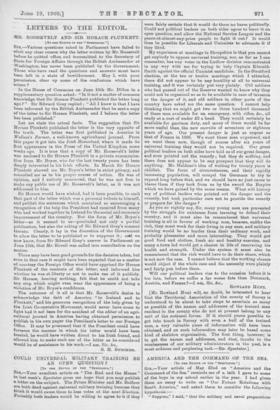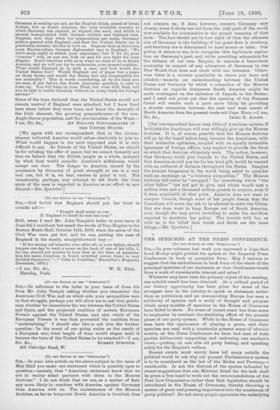AMERICA AND THE COMMAND OF THE SEA., ITo Tea EDITOR
OF TUE " SPROTATOR."J SIR, —Your article of May 22nd on "America and the Command of the Sea" reminds me of a talk I gave to some of the boys in my school earlier in the year. I had given them an essay to write on " Our Future Relations with South America," and asked them to consider the following hypothesis :— • • • " Suppose," I said, " that the military and naval preparations Germany is making are not, as the English think, aimed at Great Britain, but at South America, the only available country to which Germany can expand, as expand she must, and which is already honeycombed with German settlers and business men. Suppose, now, that when her preparations are made, Germany picks a quarrel with England, and.that the United States (as is practically certain) decides to look on, Suppose that at this crisis some Machiavellian German diplomatist says to England: ' We don't mean really to attack your supremacy, but if we do, your "cousins " will, as you see, look on and let you fight for your Empire. Don't interfere with us in what we want to do in South America, and we will not try to undermine your present position.' What would England do in such a case, and how would the United States feel P Would England out of pique buy a peace on those terms, and would the States feel any compunction for her neutrality P This is worth considering, as by the time you are men, if not before, the South American question is sure to come up. You will keep up your Fleet, but even with that, will you be able to tackle Germany without an Army ready for foreign service P "
Some of the boys declared that the United States would not remain neutral if England were attacked, but I have lived here since before they were born, and know the strength of the• Irish element, the growing preponderance of the non- Anglo-Saxon population, and the provincialism of the West.—
I am, Sir, &c., AN ENGLISH SCHOOLMASTER IN
THE UNITED STATES.
We agree with our correspondent that in the circum- stances indicated America would refuse absolutely to join us. What would happen in the next supposed ease it is very difficult to say. As friends of the United States, we 13110111d be for refusing the offer of peace, but we cannot honestly say that we believe that the British people as a whole, annoyed by what they would consider America's selfishness, would accept our view. The danger to America caused by the possession by Germany of great strength at sea is a very real one, but it is, we fear, useless to point it out. Not unnaturally, perhaps, any attempt to set forth the true state of the case is regarded in America as an effort to sow discord.—ED. Spectator.]











































 Previous page
Previous page